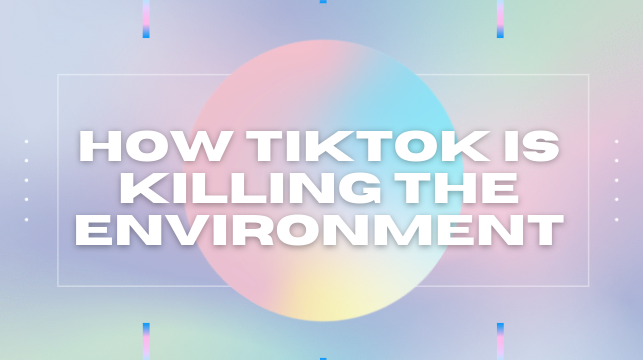How TikTok Is Killing The Environment
March 25, 2022
It’s no surprise to anybody with a social media presence to hear that TikTok has completely taken control of the charts, changing every industry from music, TV, and even food. Yet the biggest impact on an industry caused by this app is often forgotten about – clothing. TikTok has created a culture of buying new clothes every time a style becomes popular, creating new waste every few weeks.
Although fashion has been known to be one of the fastest-changing industries, it’s never been quite as quick as this. This phenomenon of constantly changing trends and styles created by the online world is known as microtrends. Trends that go in and out of fashion faster than you can scroll have completely changed the way the fashion world works. But it doesn’t stop there; the waste created by these trends and influencers throwing out and buying new clothes from cheaper, less sustainable fashion brands has impacted the environment in a way you wouldn’t expect.
It’s important to acknowledge how trends work, spread, and why TikTok has such a strong hold on the fashion industry. Fashion trends have been a thing for hundreds of years and have changed depending on the social, cultural, and political climate. It’s no surprise that this digital era of quick communication has caused fashion trends to go in and out of style just as fast. The rise of TikTok has only contributed to this problem of short-lived styles. Its massive platform and endless scroll feature have caused anybody interested in fashion to come across videos promoting certain outfits and aesthetics that will only stay in style for only a few weeks, or even days.
This is exactly how microtrends, or trends with extremely short lifespans that won’t carry over into future styles, gain traction. So why is this a problem? The answer is simple – this way of thinking is extremely wasteful and, if this pattern continues, could become detrimental to the environment. Clothes purchased from fast fashion companies are cheap for a reason. They’re made in sweatshops across the world that underpay their workers, they’re made from completely cheap and non-biodegradable materials, and they rarely last longer than a couple of wears. While purchasing a small number of clothes from these websites is completely okay, making up your entire wardrobe based on these websites’ cheap clothes and prices are hurting yourself, and the world, far more than you may realize.
Fixing this problem is simple: practicing sustainable fashion will not only give you more wears on a shirt and better environmental impacts, but it may even save you money. There’s nothing wrong with buying clothes from online shops and fast-fashion stores. If you’ve ever gone to a mall, you’re probably already aware that mainstream clothes can be overpriced, ill-fitting, and uncomfortable. However, most of the clothes bought from fast-fashion stores are poorly made, cheap, and unlikely to last for longer than a couple of washes. Buying individual pieces of sustainable clothing may feel more expensive, but in the long run, you’re SAVING money instead of rebuying the same pieces of clothing over and over. Not only will this make your clothes look and feel better, it’s saving the world in small but simple ways. So if you can afford it, buy sustainably. These small, seemingly unnoticeable actions are the best steps to take towards a better world.
While there’s nothing wrong with partaking in trends and buying the occasional piece of cheap clothing, there’s no denying that this rise in fashion TikTok has played a major role in the increase of clothing waste. Week-long trends are a problem that needs to be addressed by everyone involved in the online fashion world. Becoming more aware of your clothing choices and their sustainability and longevity is the best way to combat this problem we have created. Simply just being aware of this issue is the first step to a better, healthier planet.

vintage.thomas • May 12, 2025 at 1:50 pm
tik tok is making people believe that the tik tok shop helps them get a better hygiene and mostly their products can hurt them because they put in chemicals in their product causing it to hurt the people and the environment
Louise Savage • Jul 5, 2022 at 12:58 pm
Thanks for this info! People must learn to reuse !
Stop buying clothes they do not need!